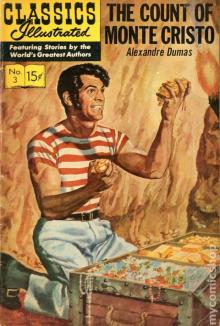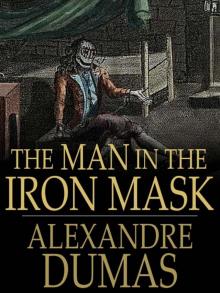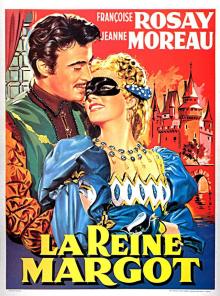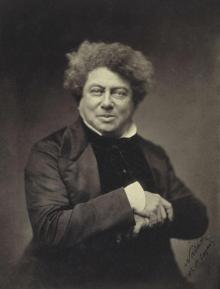- Home
- Alexandre Dumas
Vingt ans après. English Page 8
Vingt ans après. English Read online
Page 8
8. D'Artagnan, Going to a Distance to discover Aramis.
On entering the hotel D'Artagnan saw a man sitting in a corner by thefire. It was Planchet, but so completely transformed, thanks to the oldclothes that the departing husband had left behind, that D'Artagnanhimself could hardly recognize him. Madeleine introduced him in presenceof all the servants. Planchet addressed the officer with a fine Flemishphrase; the officer replied in words that belonged to no language atall, and the bargain was concluded; Madeleine's brother enteredD'Artagnan's service.
The plan adopted by D'Artagnan was soon perfected. He resolved not toreach Noisy in the day, for fear of being recognized; he had thereforeplenty of time before him, for Noisy is only three or four leagues fromParis, on the road to Meaux.
He began his day by breakfasting substantially--a bad beginning when onewants to employ the head, but an excellent precaution when one wants towork the body; and about two o'clock he had his two horses saddled, andfollowed by Planchet he quitted Paris by the Barriere de la Villete. Amost active search was still prosecuted in the house near the Hotel dela Chevrette for the discovery of Planchet.
At about a league and a half from the city, D'Artagnan, finding that inhis impatience he had set out too soon, stopped to give the horsesbreathing time. The inn was full of disreputable looking people, whoseemed as if they were on the point of commencing some nightlyexpedition. A man, wrapped in a cloak, appeared at the door, but seeinga stranger he beckoned to his companions, and two men who were drinkingin the inn went out to speak to him.
D'Artagnan, on his side, went up to the landlady, praised herwine--which was a horrible production from the country of Montreuil--andheard from her that there were only two houses of importance in thevillage; one of these belonged to the Archbishop of Paris, and was atthat time the abode of his niece the Duchess of Longueville; the otherwas a convent of Jesuits and was the property--a by no means unusualcircumstance--of these worthy fathers.
At four o'clock D'Artagnan recommenced his journey. He proceeded slowlyand in deep reverie. Planchet also was lost in thought, but the subjectof their reflections was not the same.
One word which their landlady had pronounced had given a particular turnto D'Artagnan's deliberations; this was the name of Madame deLongueville.
That name was indeed one to inspire imagination and produce thought.Madame de Longueville was one of the highest ladies in the realm; shewas also one of the greatest beauties at court. She had formerly beensuspected of an intimacy of too tender a nature with Coligny, who, forher sake, had been killed in a duel, in the Place Royale, by the Duc deGuise. She was now connected by bonds of a political nature with thePrince de Marsillac, the eldest son of the old Duc de Rochefoucauld,whom she was trying to inspire with an enmity toward the Duc de Conde,her brother-in-law, whom she now hated mortally.
D'Artagnan thought of all these matters. He remembered how at the Louvrehe had often seen, as she passed by him in the full radiance of herdazzling charms, the beautiful Madame de Longueville. He thought ofAramis, who, without possessing any greater advantages than himself, hadformerly been the lover of Madame de Chevreuse, who had been to a formercourt what Madame de Longueville was in that day; and he wondered how itwas that there should be in the world people who succeed in every wish,some in ambition, others in love, whilst others, either from chance, orfrom ill-luck, or from some natural defect or impediment, remainhalf-way upon the road toward fulfilment of their hopes andexpectations.
He was confessing to himself that he belonged to the latter unhappyclass, when Planchet approached and said:
"I will lay a wager, your honor, that you and I are thinking of the samething."
"I doubt it, Planchet," replied D'Artagnan, "but what are you thinkingof?"
"I am thinking, sir, of those desperate looking men who were drinking inthe inn where we rested."
"Always cautious, Planchet."
"'Tis instinct, your honor."
"Well, what does your instinct tell you now?"
"Sir, my instinct told me that those people were assembled there forsome bad purpose; and I was reflecting on what my instinct had told me,in the darkest corner of the stable, when a man wrapped in a cloak andfollowed by two other men, came in."
"Ah ah!" said D'Artagnan, Planchet's recital agreeing with his ownobservations. "Well?"
"One of these two men said, 'He must certainly be at Noisy, or be comingthere this evening, for I have seen his servant.'
"'Art thou sure?' said the man in the cloak.
"'Yes, my prince.'"
"My prince!" interrupted D'Artagnan.
"Yes, 'my prince;' but listen. 'If he is here'--this is what the otherman said--'let's see decidedly what to do with him.'
"'What to do with him?' answered the prince.
"'Yes, he's not a man to allow himself to be taken anyhow; he'll defendhimself.'
"'Well, we must try to take him alive. Have you cords to bind him withand a gag to stop his mouth?'
"'We have.'
"'Remember that he will most likely be disguised as a horseman.'
"'Yes, yes, my lord; don't be uneasy.'
"'Besides, I shall be there.'
"'You will assure us that justice----'
"'Yes, yes! I answer for all that,' the prince said.
"'Well, then, we'll do our best.' Having said that, they went out of thestable."
"Well, what matters all that to us?" said D'Artagnan. "This is one ofthose attempts that happen every day."
"Are you sure that we are not its objects?"
"We? Why?"
"Just remember what they said. 'I have seen his servant,' said one, andthat applies very well to me."
"Well?"
"'He must certainly be at Noisy, or be coming there this evening,' saidthe other; and that applies very well to you."
"What else?"
"Then the prince said: 'Take notice that in all probability he will bedisguised as a cavalier;' which seems to me to leave no room for doubt,since you are dressed as a cavalier and not as an officer of musketeers.Now then, what do you say to that?"
"Alas! my dear Planchet," said D'Artagnan, sighing, "we areunfortunately no longer in those times in which princes would care toassassinate me. Those were good old days; never fear--these people oweus no grudge."
"Is your honor sure?"
"I can answer for it they do not."
"Well, we won't speak of it any more, then;" and Planchet took his placein D'Artagnan's suite with that sublime confidence he had always had inhis master, which even fifteen years of separation had not destroyed.
They had traveled onward about half a mile when Planchet came close upto D'Artagnan.
"Stop, sir, look yonder," he whispered; "don't you see in the darknesssomething pass by, like shadows? I fancy I hear horses' feet."
"Impossible!" returned D'Artagnan. "The ground is soaking wet; yet Ifancy, as thou sayest, that I see something."
At this moment the neighing of a horse struck his ear, coming throughdarkness and space.
"There are men somewhere about, but that's of no consequence to us,"said D'Artagnan; "let us ride onward."
At about half-past eight o'clock they reached the first houses in Noisy;every one was in bed and not a light was to be seen in the village. Theobscurity was broken only now and then by the still darker lines of theroofs of houses. Here and there a dog barked behind a door or anaffrighted cat fled precipitately from the midst of the pavement to takerefuge behind a pile of faggots, from which retreat her eyes would shinelike peridores. These were the only living creatures that seemed toinhabit the village.
Toward the middle of the town, commanding the principal open space, rosea dark mass, separated from the rest of the world by two lanes andovershadowed in the front by enormous lime-trees. D'Artagnan lookedattentively at the building.
"This," he said to Planchet, "must be the archbishop's chateau, theabode of the fair Madame de Longueville; but the convent, where isthat?"
&nbs
p; "The convent, your honor, is at the other end of the village; I know itwell."
"Well, then, Planchet, gallop up to it whilst I tighten my horse'sgirth, and come back and tell me if there is a light in any of theJesuits' windows."
In about five minutes Planchet returned.
"Sir," he said, "there is one window of the convent lighted up."
"Hem! If I were a 'Frondeur,'" said D'Artagnan, "I should knock here andshould be sure of a good supper. If I were a monk I should knock yonderand should have a good supper there, too; whereas, 'tis very possiblethat between the castle and the convent we shall sleep on hard beds,dying with hunger and thirst."
"Yes," added Planchet, "like the famous ass of Buridan. Shall I knock?"
"Hush!" replied D'Artagnan; "the light no longer burns in yonderwindow."
"Do you hear nothing?" whispered Planchet.
"What is that noise?"
There came a sound like a whirlwind, at the same time two troops ofhorsemen, each composed of ten men, sallied forth from each of the laneswhich encompassed the house and surrounded D'Artagnan and Planchet.
"Heyday!" cried D'Artagnan, drawing his sword and taking refuge behindhis horse; "are you not mistaken? is it really for us that you mean yourattack?"
"Here he is! we have him!" cried the horsemen, rushing on D'Artagnanwith naked swords.
"Don't let him escape!" said a loud voice.
"No, my lord; be assured we shall not."
D'Artagnan thought it was now time for him to join in the conversation.
"Halloo, gentlemen!" he called out in his Gascon accent, "what do youwant? what do you demand?"
"That thou shalt soon know," shouted a chorus of horsemen.
"Stop, stop!" cried he whom they had addressed as "my lord;" "'tis nothis voice."
"Ah! just so, gentlemen! pray, do people get into a passion at random atNoisy? Take care, for I warn you that the first man that comes withinthe length of my sword--and my sword is long--I rip him up."
The chieftain of the party drew near.
"What are you doing here?" he asked in a lofty tone, as that of oneaccustomed to command.
"And you--what are you doing here?" replied D'Artagnan.
"Be civil, or I shall beat you; for although one may not choose toproclaim oneself, one insists on respect suitable to one's rank."
"You don't choose to discover yourself, because you are the leader of anambuscade," returned D'Artagnan; "but with regard to myself, who amtraveling quietly with my own servant, I have not the same reasons asyou have to conceal my name."
"Enough! enough! what is your name?"
"I shall tell you my name in order that you may know where to find me,my lord, or my prince, as it may suit you best to be called," said ourGascon, who did not choose to seem to yield to a threat. "Do you knowMonsieur d'Artagnan?"
"Lieutenant in the king's musketeers?" said the voice; "you are Monsieurd'Artagnan?"
"I am."
"Then you came here to defend him?"
"Him? whom?"
"The man we are seeking."
"It seems," said D'Artagnan, "that whilst I thought I was coming toNoisy I have entered, without suspecting it, into the kingdom ofmysteries."
"Come," replied the same lofty tone, "answer! Are you waiting for himunderneath these windows? Did you come to Noisy to defend him?"
"I am waiting for no one," replied D'Artagnan, who was beginning to beangry. "I propose to defend no one but myself, and I shall defend myselfvigorously, I give you warning."
"Very well," said the voice; "go away from here and leave the place tous."
"Go away from here!" said D'Artagnan, whose purposes were in conflictwith that order, "that is not so easy, since I am on the point offalling, and my horse, too, through fatigue; unless, indeed, you aredisposed to offer me a supper and a bed in the neighborhood."
"Rascal!"
"Eh! monsieur!" said D'Artagnan, "I beg you will have a care what yousay; for if you utter another word like that, be you marquis, duke,prince or king, I will thrust it down your throat! do you hear?"
"Well, well," rejoined the leader, "there's no doubt 'tis a Gascon whois speaking, and therefore not the man we are looking for. Our blow hasfailed for to-night; let us withdraw. We shall meet again, Masterd'Artagnan," continued the leader, raising his voice.
"Yes, but never with the same advantages," said D'Artagnan, in a tone ofraillery; "for when you meet me again you will perhaps be alone andthere will be daylight."
"Very good, very good," said the voice. "En route, gentlemen."
And the troop, grumbling angrily, disappeared in the darkness and tookthe road to Paris. D'Artagnan and Planchet remained for some momentsstill on the defensive; then, as the noise of the horsemen became moreand more distant, they sheathed their swords.
"Thou seest, simpleton," said D'Artagnan to his servant, "that theywished no harm to us."
"But to whom, then?"
"I'faith! I neither know nor care. What I do care for now, is to make myway into the Jesuits' convent; so to horse and let us knock at theirdoor. Happen what will, the devil take them, they can't eat us."
And he mounted his horse. Planchet had just done the same when anunexpected weight fell upon the back of the horse, which sank down.
"Hey! your honor!" cried Planchet, "I've a man behind me."
D'Artagnan turned around and plainly saw two human forms on Planchet'shorse.
"'Tis then the devil that pursues!" he cried; drawing his sword andpreparing to attack the new foe.
"No, no, dear D'Artagnan," said the figure, "'tis not the devil, 'tisAramis; gallop fast, Planchet, and when you come to the end of thevillage turn swiftly to the left."
And Planchet, with Aramis behind him, set off at full gallop, followedby D'Artagnan, who began to think he was in the merry maze of somefantastic dream.

 The Count of Monte Cristo, Illustrated
The Count of Monte Cristo, Illustrated Knight of Maison-Rouge
Knight of Maison-Rouge![The Three Musketeers - Alexandre Dumas - [Full Version] - (ANNOTATED) Read online](http://i1.bookreadfree.com/14/the_three_musketeers_-_alexandre_dumas_-_[full_version]_-_annotated_preview.jpg) The Three Musketeers - Alexandre Dumas - [Full Version] - (ANNOTATED)
The Three Musketeers - Alexandre Dumas - [Full Version] - (ANNOTATED) The Man in the Iron Mask
The Man in the Iron Mask The Count of Monte Cristo (Penguin Classics eBook)
The Count of Monte Cristo (Penguin Classics eBook) Count of Monte Cristo (abridged) (Barnes & Noble Classics Series)
Count of Monte Cristo (abridged) (Barnes & Noble Classics Series) The Women's War
The Women's War La reine Margot. English
La reine Margot. English The Vicomte de Bragelonne
The Vicomte de Bragelonne__english_preview.jpg) La dame aux camélias (Novel). English
La dame aux camélias (Novel). English The Count of Monte Cristo
The Count of Monte Cristo Balsamo, the Magician; or, The Memoirs of a Physician
Balsamo, the Magician; or, The Memoirs of a Physician Ten Years Later
Ten Years Later The Romance of Violette
The Romance of Violette The Mesmerist's Victim
The Mesmerist's Victim Vingt ans après. English
Vingt ans après. English Le collier de la reine. English
Le collier de la reine. English Taking the Bastile; Or, Pitou the Peasant
Taking the Bastile; Or, Pitou the Peasant The Hero of the People: A Historical Romance of Love, Liberty and Loyalty
The Hero of the People: A Historical Romance of Love, Liberty and Loyalty Louise de la Valliere
Louise de la Valliere Les Quarante-cinq. English
Les Quarante-cinq. English Ange Pitou (Volume 1)
Ange Pitou (Volume 1) The Royal Life Guard; or, the flight of the royal family.
The Royal Life Guard; or, the flight of the royal family. Les trois mousquetaires. English
Les trois mousquetaires. English Une fille du régent. English
Une fille du régent. English The Knight of Maison-Rouge
The Knight of Maison-Rouge The Count of Monte Cristo (Unabridged Penguin)
The Count of Monte Cristo (Unabridged Penguin) Ange Pitou
Ange Pitou The Romance of Violette (vintage erotica)
The Romance of Violette (vintage erotica) The Three Musketeers
The Three Musketeers Three Musketeers (Barnes & Noble Classics Series)
Three Musketeers (Barnes & Noble Classics Series) Georges
Georges Man in the Iron Mask (Barnes & Noble Classics Series)
Man in the Iron Mask (Barnes & Noble Classics Series) The Red Sphinx
The Red Sphinx